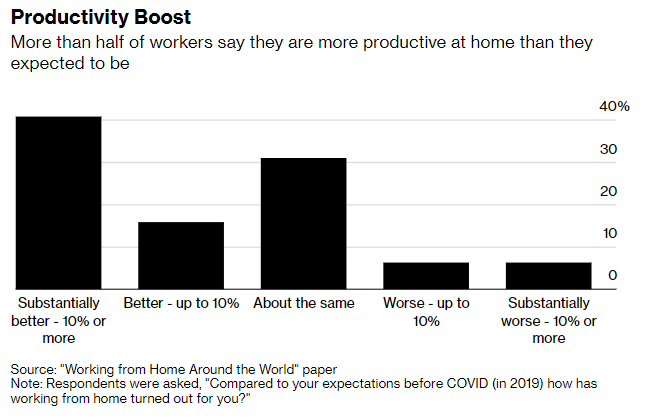Contents
- Hey! Welcome Back -
- PWC Nigeria: Virtually Unstoppable
- Forbes India: This is How You Succeed
- WFH Research: Remote Work Takes Hold
- LA Times: Wall Street Says Pay Up
- This Week’s Shareable
Two million remote workers change this country's future, a Stanford alum publishes research on new workplace norms, and Wall Street hates on remote employees - this week on Out of Office.
💣 PWC: Nigerian economy set to explode
🐦 Forbes India: Remote work rises like a phoenix
💖 WFH Research: The world embraces WFH
🙈 LA Times: Wall Street pays remote workers less
Hey! Welcome Back -
It’s episode 4 of Out of Office and I’ve got a great lineup for you today.
First we explore a mind-blowing improvement in one developing nation’s economy thanks to remote work.
Then - we review some hard-hitting facts from the logicians over at the WFH research institute, and wrap it up with a piece that proves if Wall Street hates it, it must be universally loved.
This week is a real doozy.
Let’s jump straight in -
PWC Nigeria: Virtually Unstoppable
Imagine if remote work could transform an entire country's economy!
That’s exactly what’s happening in Nigeria, according to this PWC report.
Over the next 10 years, remote programming jobs could pump $50 billion into Nigeria, giving their economy a massive boost.
Samson Akintaro reports on the article -
“With…a few local examples of companies already exporting Brain Capital from Nigeria and actively participating in the GVC’s, the report created a plausible scenario in which Nigeria captures 17% of the global programming and software development jobs. The earnings that will accrue to Nigerians performing these jobs is about $50 billion.”
Historically speaking, that kind of shift has only happened when a country digs for oil, sells its resources, or invests in unsustainable tourism practices.
🏔️ That is groundbreaking news, without having to break any actual ground.
Nigeria will go from developing to fully developed in just ten years.
The average age in Nigeria is 19 years old, which gives the country a huge edge on a global population that’s rapidly aging.
The value that remote work brings to Nigeria and countries just like it is unprecedented. We’re here for it.
Forbes India: This is How You Succeed
Are you interculturally competent? You better be, says Forbes India.
In a story making waves this week, a list was published detailing the most important intercultural skills that help people succeed in remote work environments.
Thunderbird School of Global Management says -
“Learning to work well with people unlike us is essential in a global business world.”
To help you build your own success mindset, I’ve added in some key points below.
🧠 The remote mindset
- Think differently
- Adopt a global outlook
- Communicate openly
- Trust your team members to be productive
Any you need to work on? Start now.
WFH Research: Remote Work Takes Hold
Our lead story this week reports on a series of fascinating statistics coming out of a WFH research institute, run by a Stanford University alumni. These showcase how remote work has been embraced all over the world.
⚡ Key takeaways
- The global norm is to work from home 1.5 days per week
- Leading the way is India with a national average of 2.6 days a week
- Half of all people said they are more productive working remotely
- A tiny fraction said that remote work makes them less productive

I’ll bet my right leg that the people who are less productive work in the kind of companies that make you sit in dozens of Zoom calls all day.
When that happens there’s no real opportunity to get any work done!
- A quarter of all workers would quit if they had to return to the office
- In the UK some 42% of employees would quit before returning to the office
British CEO’s should think twice about making their workforce return for 7 days a week.
😲 But the biggest surprise?
- Workers would take a 5% pay cut to keep working from home
Bloomberg writers Katia Dmitrieva and Alexandre Tanzi say -
“The shift to remote work ‘benefits workers,’ the researchers wrote. The reason is simple: Most workers value the opportunity to WFH part of the week, and some value it a lot.”
Makes sense, right - surely companies realize their people are saving money on transport and office costs. It looks like a win-win for everyone.
Everyone except Wall Street.
LA Times: Wall Street Says Pay Up
A stirring report from The LA Times, speaks about how thousands of Americans have adjusted to remote work thanks to major shifts during the pandemic.
As companies call staff back to the office, some short-sighted employers are considering paying employees less if they choose to keep working from home.
🚩🚩 Employer red flag alert 🚩🚩
What a bad move - especially since the benefits are on both sides - everyone is saving time, reducing stress and boosting productivity.
Instead of seeing a win, Wall Street predictably gets greedy.
Well I’m going to say it -
The companies that fight remote work and choose to shortchange their remote workers - they’re going to go the same way as other companies who resisted innovation.
Don’t be the next Blockbuster!
That’s it for now, I hope you enjoyed this week’s episode.
See you next week -
And remember, the future of work is Out of Office.
Andrew
This Week’s Shareable
According to a ‘Working from home around the world’ paper - half of all people are more productive working remotely, and only a tiny fraction are less productive. Looks like #remotework wins this round. Find out more on this week’s OOO.









